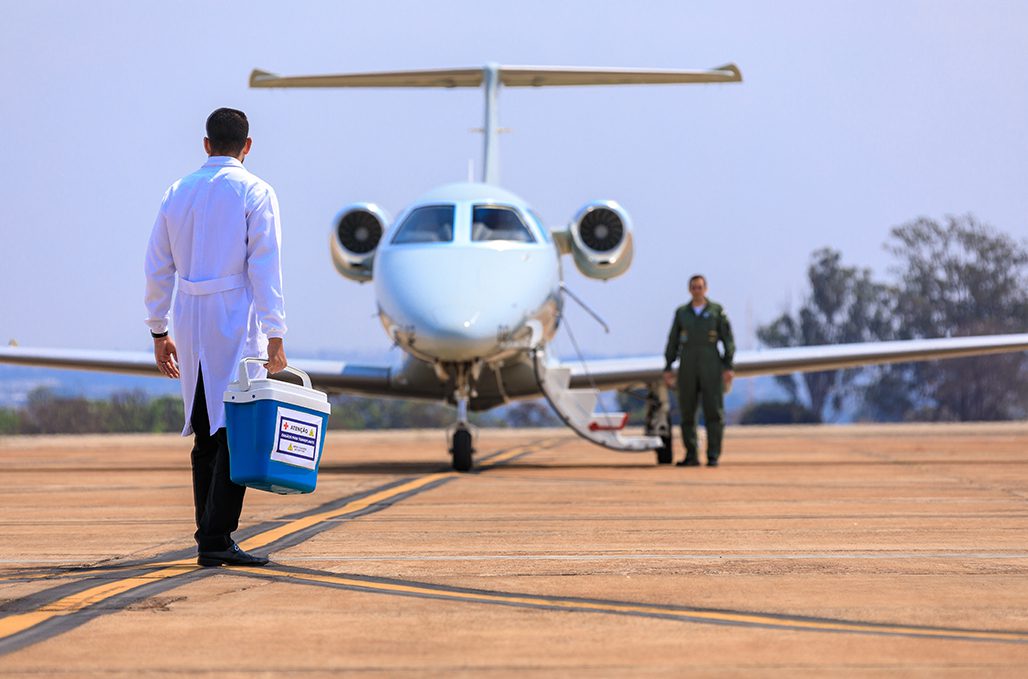Air Force Agency, by Lieutenant Roberta Nunes
A race against time! This is the motto of those who depend on a new organ to survive. A few minutes of difference can define the success of a transplant. To ensure greater agility in this process, the National Transplant Center has the fundamental support of the Brazilian Air Force (FAB). With only two hours of reaction, the crews are on call full time, and all over the country, with teams 24 hours a day, seven days a week, to carry out the transportation of organs and tissues with the greatest possible agility.
A new and healthy heart changed the story of young Alicia Alves Silva’s family. Diagnosed with myocarditis, when she was two years old, she joined the transplant queue and, with the help of FAB, was able to receive the organ. Today, at the age of 12, Alicia is in excellent health.
“I was only two years old when I had the transplant, I didn’t understand any of what was happening to me, but I see my parents telling my story to people and I feel an inexplicable emotion. People say that I am a miracle, and I know that without the FAB all this would not be possible. The agility in transporting my heart contributed to the success of my transplant. A lot of gratitude to FAB”, said Alicia.
“Today I see FAB as an institution that is directly part of my family, people I had the privilege of meeting afterwards and thanking personally for everything they did for us. A memorable role, of extreme greatness. We are very grateful that the FAB transported Alicia’s heart with such zeal,” said Giselly Alves, Alves’ mother.
The FAB transports the medical collection teams and the organs that will be transplanted to the recipients anywhere in the country. This support has always been provided by the Air Force, but since October 2017, with Decree No. 9,175, the FAB has to leave at least one aircraft available for this type of mission, meeting the requests of the Ministry of Health.
“In terms of legislation, we have to keep an aircraft always available to fulfill this mission, but in fact we have airlift squadrons scattered in all regions of Brazil, and all have a crew on call to carry out the transport of organs and tissues, with teams 24 hours a day, seven days a week, with a reaction time of two hours,” explained the Chief of the Joint Aerospace Operations Center, Air Brigadier Francisco Bento Antunes Neto.

FAB Data
According to the Aerospace Operations Command, 221 organs have been transported so far in 2022, in 205 missions, with approximately 1000 flight hours. Liver and heart are the most transported organs on FAB wings.
“When we think in terms of numbers, one might think that it is not significant, but for that person who is going to receive a heart, to that family that is going to have a joy like that – of seeing a loved one who is sick recover and have a long life – it is very important. So every unit we put there in that number of organs transported is important,” added Brigadier Antunes.
“When we are called for a mission like this, the feeling is of gratitude for collaborating with something so important and that also requires a lot of commitment and responsibility so that everything runs smoothly. The feeling of being able to help save a life is unique. For me, each of these flights is very special and renews the feeling of accomplishment with the delivery of results to the Brazilian society,” said Major Leandro Soriano Evangelista, from the Sixth Airlift Squadron (6th ETA).

Triggering
The whole organ, tissue, and human body part transportation process starts when the National Transplant Center (CNT) is informed by a state center about the existence of an organ and tissue in clinical conditions for such purpose. The CNT calls the airlines to check logistical availability. If there is a compatible flight, commercial airplanes receive the organ and take it to its destination. When there is not, the Center contacts the FAB, which moves one or more planes to pick up and transport the organ.
The requests reach the Aerospace Operations Command (COMAE), located in Brasilia (DF), which is responsible for planning the missions. That is where there is a current operations division, with several cells: some taking care of aerospace defense, others of rescue and salvage, and one of them is dedicated 24 hours a day to be in a position to receive this call from the CNT. So it is this cell that will plan how the mission is going to happen and make the necessary coordinations. The coverage of this service covers the whole country.
National Organ Donation Day
The National Day for Organ Donation, celebrated on September 27, aims to make society aware of the importance of donation and, at the same time, get people to talk to family and friends about the subject.
Photos: Petty Officer Johnson and Sergeant Viegas / CECOMSAER *** Translated by DEFCONPress FYI Team ***
